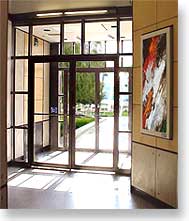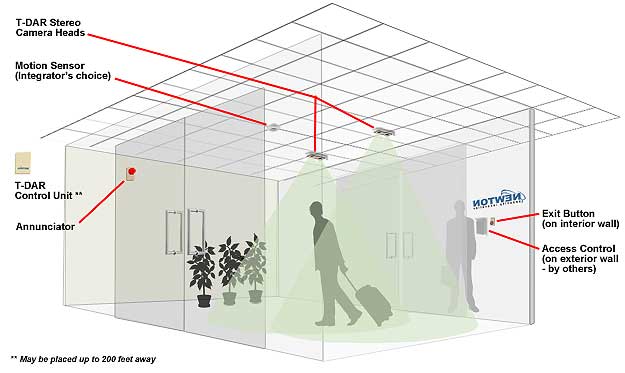What is a mantrap?
A mantrap is a secured space equipped with two or more interlocking doors and a single person detection system insuring that only one person passes through into a restricted area.

Lobby Shield Retrofit
The Lobby Shield retrofit of a typical, card entry vestibule like the one above includes two ceiling-mounted camera heads, a ceiling or wall-mounted motion sensor, a wall-mounted audible and flashing alarm unit (not shown), electronic locks and a control unit.
Lobby Shield Benefits:
- Simple to install - no civil works such as the digging up of expensive flooring.
- Adapts to existing building and can be installed into an existing vestibule or small lobby, unlike the portal solution which can cause user rejection due to claustrophobia, etc.
- A typical installation includes one or two, small, visually unobtrusive stereo camera heads which are surface-mounted on ceiling, or alternately, may be mounted above a drop-ceiling.
- Seamless incorporation into existing building security systems.
- Low or no maintenance -
The system has no motors, gearboxes or moving parts to wear out or break - No special lighting required; overhead office-level of 300 lux is sufficient and the system is unaffected by full ambient light from the outside.
- Allows mixed traffic - can be used as an entry and egress point for both pedestrian and carts without the need of special staging areas on the floor.
Like more information?
Contact us at:
sales@newtonsecurity.com
or call 425-251-9494
Lobby Shield - A Medium Security Vestibule Mantrap System
The Lobby Shield system is a package of modules that may be retro-fitted into a commonly configured building vestibule, converting that space into a medium security mantrap which insures the entry of only one authorized person at a time while ignoring any cart, luggage or parcel in their possession.

The system is a combination of interconnected electronic door locks, ceiling-mounted stereo cameras, sophisticated software and a motion detectors that have the ability to identify, tag and track the human form within the mantrap, insuring that there is only one person present, thus eliminating the security risks of piggybacking and tailgating. Lobby Shield is designed to work with the most common vestibule door control configuration: a card reader or PIN unit adjacent to the locked outside door.
How It Works
The following is the sequence of events for a normal passage:
- The outer vestibule door is normally always locked.
- The inner lobby door is normally always unlocked.
- When a person accesses the control system reader on the outside and is approved, the outer door unlocks and the inner lobby door locks.
- As the person enters the vestibule the system quickly scans the area to detect if only one person is present.
- If there is only a single person, the outside door is locked, followed immediately by the unlocking of the inner door, often before the person reaches it.
- When the person passes into the lobby, the inner door closes behind and remains unlocked.
- The Lobby Shield is now ready for the next passage.
If there is a violation with more than one person present:
- If the entry scan detects more than one person in the vestibule, the outer door remains unlocked and the inside lobby door remains locked.
- There is both a flashing light and an audible alarm which includes a recorded message for all present to exit to the outside and for only one person to initiate the entry process again.
- The system resets itself after 10 seconds, once it has determined that the vestibule is empty.
One or more persons may exit the building at once through the Lobby Shield:
- They open the unlocked inner door and enter the vestibule.
- The inner door closes behind them and it remains unlocked.
- An "Exit" button, located in the vestibule adjacent to the outer door, is pushed.
- This locks the inner door and unlocks the outer door to exit the mantrap.
- If another person, who has received authorization from access control, enters the vestibule from the outside while someone is exiting, they will be allowed to continue as a normal entry.
- But if that person has not been authorized, an alarm will sound, the inner door remains locked and they will need to exit to the outside.
